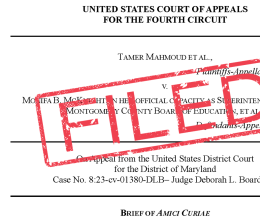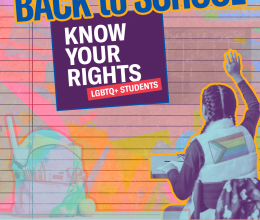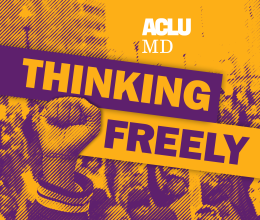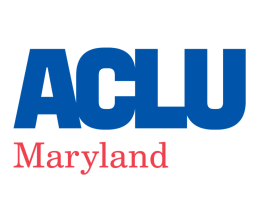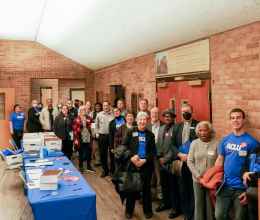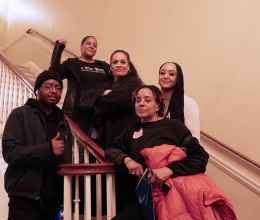

Maryland General Assembly's 2017 session was an active one!
We rallied people in Annapolis, sent letters, emails, and postcards. We made phone calls, earned press, made lobby visits, and coordinated a social media campaign in an effort to help City Schools address a $130 million budget gap.
We also worked to secure funding for full-day pre-K, ban suspensions and expulsions for Maryland's youngest learners, protect public schools from the threat of privatization and more.
Public Education Funding
Special Grants to Cover Shortfall for Several Maryland School Districts
After cutting education funding in prior years, this year Gov. Hogan funded the education formula according to current law, which directs an increase of 1.3% over the previous year's funding to Maryland school districts for FY2018 (School Year 2017-18). Some school districts received more funding due to increases in student enrollment. Other districts lost funding due to shrinking enrollment or changes in their county's wealth, but those factors alone do not account for the budgetary problems that several school districts are experiencing.
Since the state cut inflationary increases in the education funding formula in 2007-08, state analysts estimate that Maryland school districts have been deprived of $1.6 billion.
Those cuts have greatly compromised the ability of certain school districts to provide an adequate education for their students, especially for low-wealth districts that depend heavily on state funding.
Given the education funding shortfall at the state level and shrinking enrollment, the ACLU and allies advocated for additional funding to ensure that certain school districts could mitigate cuts to teachers and staff at the school level.
The "Bridge to Kirwan" funding package for Baltimore City Schools
House Appropriations Chair Maggie McIntosh worked with Delegate Krebs and Senator McFadden to pass HB684/SB1024 (State Grants to Education Aid), which provide $28.2 million in grants to struggling school districts*. In addition, given City Schools' $130 million structural budget deficit for FY2018, the legislature approved bills that relieve the district of certain spending mandates, freeing up $13.9 million to direct to the classrooms. The following is a break-down of the state's $38 million contribution in the "Bridget to Kirwan" funding package for City Schools:
State Grants in Supplemental Budget (HB684/SB1024)
- $10.2 million from Pre-K grant
- $13.5 million from declining enrollment grant
Spending relief (amounts City Schools will not have to pay due to enacted state legislation)
- $4.6 million from accessing surplus bottle tax revenue in the 21st Century Building Program
- $1.8 million from the state paying increased pension costs (HB1109)
- $7.5 million from provision of MTA passes to students (SB1149)
See #FixTheGap summary below for more details, including commitments from the City.
Additionally, the General Assembly restored important funding that the Governor had cut: $2.5 million in after-school and summer program funding (with $7.5 m. in FY19) and $5 million for the Next Generation Scholars Program.
------------------------------
* HB684/SB1024 provides $23.7 million for City Schools and $4.5 million for certain rural districts with (1) declining enrollment; and/or (2) full-day pre-K programs. Since this bill required action from the Governor, BEC held a press conference to ensure that he provided a supplemental budget to release the funds. Counties that will receive additional funding: Allegany ($793,000), Calvert ($240,000), Carroll ($1.6 million), Cecil ($190,000), Garrett ($456,000), Harford ($356,000), Kent ($215,000), Queen Anne's ($22,000), Somerset ($455,000), and Talbot ($133,000).
Fair Treatment of All Students
For the last 10 years, state data has revealed wide variations in the way Maryland school districts respond to disciplinary infractions among different groups of students. African American, Latino, and students with disabilities are significantly more likely than white students to be suspended or expelled for similar infractions. Disproportionate treatment of students exacerbates the disparity in academic achievement and outcomes for minority students.
This session, legislators took great steps toward equity and fairness by passing bills to shrink the number of suspensions and expulsions; change behaviors by providing supports and interventions; and take a systematic approach to shifting school climate across the state.
SB 651/HB 425: Public Schools - Suspensions and Expulsions - PASSED
Legislation sponsored by Sen. Will Smith (Montgomery) and Del. Brooke Lierman (Baltimore City) will curb the overuse of suspension and expulsion for children in pre-K through the second grade in public schools. It allows removal only in extreme circumstances, at the determination of the school administration in consultation with the appropriate behavioral or mental health staff. It also requires the use of research-based alternatives, including positive behavioral interventions and referrals to individualized education teams, responses that some schools are already successfully implementing. Read the ACLU's testimony.
HB 1287: Commission of the School-to-Prison Pipeline & Restorative Practices- PASSED
Del. Alonzo Washington's (Prince George's) bill will form a Commission to study current discipline practices, analyze the relationship between disciplinary trends and the juvenile and criminal justice systems, and review national best practices on restorative practices. Its goal is to identify ways to transform counterproductive practices with all impacted stakeholders working together to build trusting and engaging schools. The Commission will report its findings and recommendations to the Governor and General Assembly January 2019. Read the ACLU's testimony.
SB 1/HB 286: Specialized Intervention Services - Reports- PASSED
Legislation filed by Sen. Joan Carter Conway (Baltimore City) and Del. Marc Korman (Montgomery) requires county boards of education to report and publish the use and results of specialized student support services. ACLU supported this bill because it would improve transparency and coordination of support services, which is especially critical for improving outcomes for Maryland's high-need populations. Read the ACLU's testimony.
School Construction: Level Funding for Most Districts, Some Will Receive More
Capital Improvement Program (CIP) - $285 Million
The state legislature added $5 million to Gov. Hogan's CIP for school construction, renovations, and repairs for a total of $285 million statewide for FY2018.
The ACLU and Baltimore Education Coalition brought students from John Eager Howard Elementary School to the annual House and Senate budget committee briefings to support the $1 billion school construction program, which the ACLU and allies worked to pass in 2013.
Students expressed excitement to attend a newly rebuilt 21st century school, but also reported the challenges of closing Westside ES and merging the two school communities. State and city officials reported that the program was on track to complete 23-28 schools by 2020!
Read the full annual report for the 21st Century School Construction Program.
Other School Construction Programs and Changes
Additional Funding for Counties with Growing Enrollment - $60 Million: While some systems got additional funding in the operating budget, Montgomery, Anne Arundel, Prince George's, Howard, and Baltimore counties together received an additional $60 m. in capital funding outside of the regular Capital Improvement Program. This new program established by the legislature in 2015 provided $20 million for school districts with significant enrollment growth and a large number of relocatable classrooms; it was doubled in 2014 and an additional $22.5 million was added this year.
Aging Schools Programs (ASP) - $6.1 Million:
Level funding for ASP was maintained; this funding goes to districts with the oldest school buildings.
Qualified Zone Academy Bonds (QZAB) - $4.8 Million:
Level funding was maintained; districts apply for QZAB funding, which requires private sector support. Baltimore City has been using QZAB to supplement grant funding from the Weinberg Foundation to renovate old libraries in city schools.
Non-Public Aging Schools Program - $3.5 Million:
Despite billions in unmet need for public school buildings, the legislature again approved the Governor's allocation of $3.5 m. in the capital budget for private and religious school buildings, a budget item established in 2014.
SB 334/HB 692 - School Emergency Air-Conditioning Fund - FAILED:
Sponsored by Sen. Bill Ferguson and Del. Keith Haynes (Baltimore City), this bill would have provided $30 m. to districts that need to install new or repair aging air-conditioning systems. City Schools has 72 buildings without air-conditioning and must redirect limited CIP dollars from critical health and safety projects to fund its air conditioning plan. Read the ACLU's testimony.
Changes in State Approval for School Construction Spending:
Legislators approved a change in law that gives the state's Interagency Committee on School Construction (IAC) the authority to fully appropriate the state's school construction funding to Maryland school districts. This change removes the Board of Public Works from the approval process.
A Number of Wins on Education Policy & Funding
Funding for Full-Day Prekindergarten - PASSED
Full-day pre-K classes in Baltimore have been provided for years. Though the state provides only partial funding for half-day, full-day programs benefit the children but stress the budget. SB 346, filed by Sen. Joan Carter Conway (Baltimore City) would have provided funding for full-day Pre-K programs across the state. Read ACLU's testimony here.
While SB 346 did not move, during budget discussions City legislators noted that the lack of funding for full-day pre-K was one of the drivers of City Schools' deficit. As a part of the Bridge to Kirwan package , an amendment was added to HB684 / SB102 4 to phase in over three years the equivalent of funding for the remaining half-day per pupil for systems in which all of the pre-K programs are full-day. This funding both reimburses the current 4 counties that have all-day pre-K and could incentivize other districts to implement full-day programs. The ACLU has been a strong proponent of fully funding full-day pre-K in the formula, which was also supported by the state's Kirwan Commission consultants.
HB 516/SB 581: Workgroup for Implementation of Universal Pre-K- PASSED
Bills sponsored by Del. Vanessa Atterbeary (Howard) and Sen. Bill Ferguson establish a workgroup to make recommendations on an implementation plan for universal pre-K for four-year-olds. A report to the Kirwan Commission is due by September 2017. Read the ACLU's testimony.
HB 978: "Protect Our Schools Act" - PASSED
This legislation, sponsored by Del. Eric Luedtke and Sen. Craig Zucker (Montgomery), is designed to guide the Maryland State Department of Education on various aspects of their implementation of the Every Student Succeeds Act (ESSA), the most recent federal law on public school accountability. The bill provides a balance of accountability, which include measures based on academic assessments and School Quality and Student Success indicators. It also requires important checks and balances around intervention strategies for schools classified as "Comprehensive Support and Improvement" schools, explicitly limiting the State Board of Education from taking certain actions such as hiring management companies to privatize schools, converting schools to charters without local approval, or creating.... Provisions include the creation of a governing board and an advisory council made up of a cross-section of business leaders, non-profits, educators and other community stakeholders to provide advice on a range of topics. The bill sunsets in three years.
HB 562/SB 1012: City School Board Appointments - PASSED
These bills, sponsored by Del. Antonio Hayes and Sen. Joan Carter Conway, make several changes to the appointment of the Baltimore City Board of School Commissioners, originally established in the ACLU's 1996 Bradford consent decree and subsequent legislation. The bills do three things: (1) remove the Governor from the co-appointment process, leaving the Mayor to appoint board members; (2) maintain the categories of expertise required of board members who will be appointed - Management, Education, Expertise in disabilities issues, Parent; and (3) remove the State Board of Education from the vetting process and make official the review by a Community Panel that has makes recommendations to the Mayor.
HB 878/ SB 704: Charter School Act - FAILED
The Governor's bills would have significantly changed the way charter schools operate in Maryland, establishing a separate chartering authority and substantially undermining the state's formula allocation of funding for all schools. Read the ACLU's testimony.
HB 287/SB 361: Hunger-Free Schools (Proxy for Poverty) - PASSED
Because state education aid is distributed based in part on the number of children in poverty in a school district, these bills were necessary to protect school funding for children participating in the Community Eligibility Program (free meals for all children in schools of specified poverty rates). The law will be in effect until FY22, with the assumption that the Kirwan Commission and subsequent legislation will determine a "proxy for poverty" alternative to FARMs forms in the education formula. Read the ACLU's coalition testimony.
Religious/Private School Voucher Program
Pressure built this session to discontinue Gov. Hogan's private school voucher "BOOST" program, instituted through the budget (without a hearing) last year. The House initially reduced funding to provide vouchers only toward students who had moved from public school (since it was found that 78% of the vouchers had gone to students already attending the religious schools). The final compromise ended with a cut of $1.5 million to the Governor's proposal, leaving $5.5 million, an increase of $500,000 over last year.
#FixTheGap: Budget Gap Dramatically Reduced for Baltimore Schools
Baltimore City Public Schools (City Schools) announced a $130 million structural deficit for FY2018 (School Year 2017-18), and CEO Dr. Santelises reported that she would have to lay off approximately 1,000 teachers and school staff to balance the budget. A significant part of the funding shortfall came from the loss of $42 million in state aid, due to dropping enrollment and increased City wealth. ACLU crunched the numbers and explained the cause of the structural deficit to policymakers: flat state funding to City Schools over the past nine years. If the state education formula had not been cut in 2007-08, City Schools would be receiving an additional $290 million per year according to the original formula.
To prevent disastrous cuts to schools citywide, the Baltimore Education Coalition (BEC), co-chaired by the ACLU, launched the campaign to #FixTheGap in January to advocate for additional funding for City Schools. In February, BEC worked with school communities to fill 40 buses and rallied over 2,000 people at the State House in Annapolis to urge the Mayor and Governor to work collaboratively to fix City Schools' $130 million structural budget gap. BEC also asked for a multi-year fix to ensure that City Schools could keep school level budgets largely intact until an improved education funding formula is adopted by the state legislature. Delegate McIntosh and Mayor Pugh responded by proposing a $180 million "Bridge to Kirwan" funding package which provides both additional revenue and spending relief for City Schools over the next three years.
The funding package also includes Mayor Pugh's commitment of $22 million which is required in state budget language and is now in her proposed budget for FY2018. Altogether, the "Bridge to Kirwan" will provide approximately $60 million per year to help mitigate City Schools' structural budget deficit. CEO Dr. Santelises has also committed to identifying $30 million at City Schools' headquarters - through a spending freeze/reductions and tapping reserve funds - to further mitigate cuts to the classrooms.
It is also possible that City Schools will receive an additional $10 million pledged by City Council President Jack Young (it is not known if that funding is one-time or for three years). Mayor Pugh would have to agree, and provide a supplemental budget to reappropriate the funding to City Schools.
Lastly, City Schools reported that additional savings are possible through renegotiating the teachers contract with the union.
Read our summary of the "Bridge to Kirwan" and other resources committed to #FixTheGap.
The Kirwan Commission and the Fight for Adequate Funding
Because the ACLU, BEC, and advocates citywide took a stand this year, additional funding and support for Baltimore City schools will prevent draconian cuts to the classrooms for the next three years. However, the fate of Baltimore's schools, and for Maryland districts that also fall short of funding "adequacy", will depend on the will of the state legislature and Governor Hogan.
The state's consultant has already completed a study on the state education funding formula and reported that an additional $2.9 billion is needed for Maryland school districts to be adequately funded - $1.9 billion from the state and $1 billion from local governments. Far below adequacy under the current formula, Baltimore City was judged to need an additional $358 million, and Prince George's schools need $600 million. The Commission on Innovation & Excellence, chaired by Dr. William Kirwan, will review the consultant's report on education funding over the remainder of the year. The ACLU will work to ensure that the voices of parents, teachers, students, and community members are heard, and that the Commission understands the needs of the state's most at-risk population.
a separate state school district for certain schools. Although Gov. Hogan vetoed the bill, the veto was overridden by the General Assembly and passed into law. The Maryland Education Coalition, of which ACLU-MD is a part, supported the bill.
SB 908: Maryland Education Development Collaborative- PASSED
Sponsored by Sen. Bill Ferguson, this bill establishes a think tank for innovation in public education policy aimed at promoting and enhancing 21st Century learning and socioeconomic diversity in the State's public schoo
